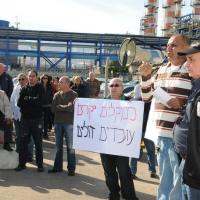
International solidarity needed
On 1 May workers at the Haifa Chemical Inc (internationally known as “Haifa”) went on strike. Why?
The workers are demanding better conditions and higher wages. They want to overcome the cuts the management have forced them to accept over the past 15 years. An historic and lengthy strike was brutally defeated in that factory in 1997. Now the gap in pay scales between the workers hired before 1998 and "newer" workers has to be overcome.
The workers and their union, Power to the Workers, are also demanding fixed union contracts for all workers who work there regularly. That means kicking out the subcontractors and offering all their workers full employment. These demands mean overcoming the divisions the management has built between the workers.
Two days before May Day, the management confronted a negotiating meeting with the Workers’ Committee and unilaterally declared steps to fire some workers and relocate facilities to its separate Southern factory.
We had to react, a workers’ meeting was immediately called. A partial strike started at the merchandise weigh station, which was enough to prevent the management taking all the merchandise out of the factory.
Then the management tried to make some concessions and asked for the gates to be opened and the negotiations to be continued. We said that we were willing to stop the industrial action only if a significant breakthrough was achieved in a negotiating meeting on Sunday morning, 1 May. They declined that offer, which was on the table for two days. So on Saturday evening we declared a full strike starting on 1 May.
You spoke about the divide between workers, what divide do you mean?
Of the 260 unionised workers now at the core of the struggle, 110 are better paid, as they have been employed in the factory longer. They still enjoy the terms and conditions won by collective bargaining before the big 1997 strike defeat. They’re called "Generation A". The other 150 of "Generation B" are covered by a "special" part of the collective agreement, which gives them much worse wages and conditions.
Additionally, there are around 130 workers on personal contracts. This is in spite of the fact that the weak collective agreements from the last 13 years allowed the management to hire only 90 on these worse conditions.

And then there is another group of over 250 workers employed by subcontractors. They are only paid the minimum wage and are faced with the worst conditions – for example, on entitlement to meals, showers, etc. They suffer most from threats and still fear getting unionised. The Workers’ Committee and the union are currently fighting for them with the aim of recruiting them to the union and the struggle. During the strike they were sent home and are under the threat of being laid off by the subcontractor.
In the factory there are workers from different backgrounds and communities: Jewish, Arab, Druze. The fight is for everyone.
Were there attempts to overcome these gaps in the past?
A few months ago, the Workers’ Committee organised a protest against the conditions of these worse-off contract workers. At first, slightly better conditions were achieved, for example, they were allowed to use the same dining rooms and showers as other workers. Later on, the subcontractors passed over the price of the meals to the workers and effectively made it too expensive for them to eat there. Additionally there’s been pressure on the workers not to use the regular showers.
What is the situation with collective bargaining?
The last collective agreement expired formally at the end of December. Since then there have been negotiations. Until late March, the General Histadrut, the main trade union organisation in Israel, was responsible for these. But the workers feared a deal being made over their heads, without being asked. They still remember the selloff carried out by Histadrut leaders during the 1997 strike, which led to the major defeat.
They then decided to move over to “Power to the Workers” (P2W), which is a new general union. It poses an alternative to the right-wing leadership of the Histadrut and its ultra-centralised, non democratic structures. The switch between the organisations was planned by the Workers’ Committee and coordinated with P2W in advance.
It would have happened earlier but there were fears that they would not be able to get the necessary majority of workers to carry it out. However, when they saw that they had reached a dead-end within the framework of the General Histadrut, the Workers Committee took the decision to go all the way. During a warning strike, a meeting of all workers was called. 200 attended. Everybody voted in favour of moving to P2W. Later on, after that eight-hour warning strike, the management locked out the workers for six days!
Since then we’ve been struggling to attempt to rollback from the recent decade of attacks on the organised labor in the factory – this will not be easy and the workers will need every help they can get and they deserveit!
We, in Power to the Workers and in the Socialist Struggle Movement, have been working around the clock to assist the workers to win their battle. Such a victory could have dramatic repercussions on the confidence of other workers’ committees to stand up and struggle against brutal management, and also to resist the union bureaucracy.

We appeal to unions and the public inside Israel but also internationally to express solidarity with the Haifa workers with letters, visits, donations. Solidarity vigils locally and internationally will be very helpful.
Please co-ordinate any solidarity measures you wish to take with: [email protected]

Be the first to comment